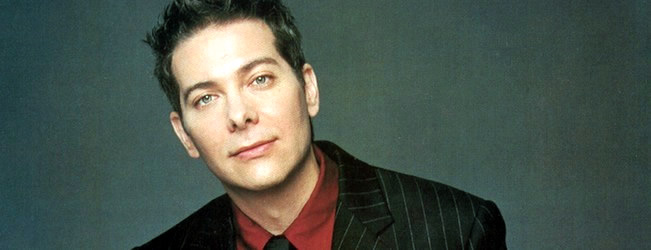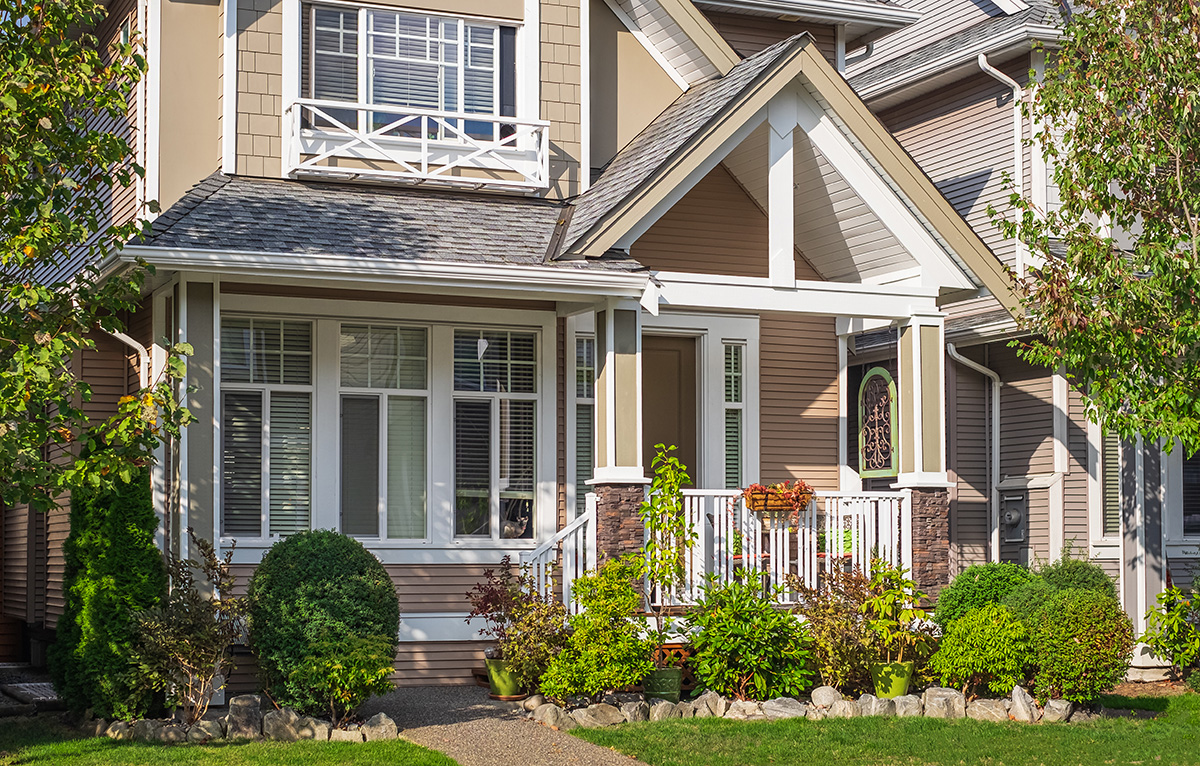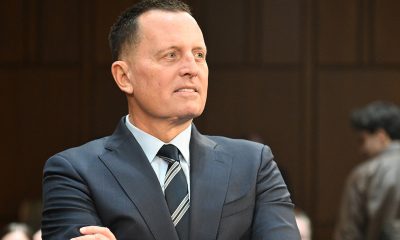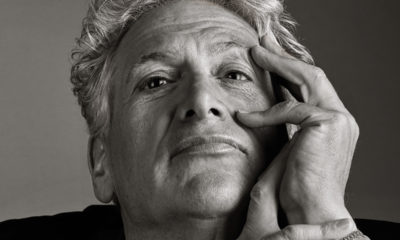Living
Curating the canon
Feinstein keeps standards alive with passion for mid-century gems

Michael Feinstein concert
7 p.m. Sunday
Kennedy Center Concert Hall
presented by the Washington Performing Arts Society
Tickets $40-$75
202-785-9727 or wpas.org
Ol’ blue eyes is back. And Feinstein’s got him.
Michael Feinstein, that is, the multi-platinum selling, five-time Grammy nominee. The cabaret-style interpreter not only of Sinatra but also Cole Porter and Irving Berlin and Richard Rodgers, the composer famous for his work with two separate lyricists, Lorenz Hart and Oscar Hammerstein III.
And a raft of others — especially the Gershwins — in the canon of Americana’s classic popular music, a genre that Feinstein himself, at a youthful 54 (still slender and boyish and with a legendary million-dollar smile) has done so much to keep alive.
He’s been called “the ambassador of the great American songbook” and married his partner Terrence Flannery in a 2008 ceremony officiated by Judge Judy (Judith Sheindlin).
And he’s back keeping the Sinatra legend alive. It started on his 2009 album “Sinatra Project.” It will continue during his Sunday night concert at the Kennedy Center Concert Hall.
“I’m doing Sinatra for sure on Sunday,” Feinstein says. “But it’s reminiscence, not a copy, because its folly to copy him.”
The show will be “very high-energy,” says Feinstein, “with new big band arrangements, a tribute to Nelson Riddle,” the longtime American arranger and bandleader who worked with Sinatra as well as Judy Garland, Peggy Lee, Rosemary Clooney and so many other vocal stars of the mid-20th century. And it will be fllled, he says, “with anecdotes about Sinatra’s life and career, which lasted from his beginnings as a swing-era idol of “bobby-soxers” in the 1940s, through his Capitol Records albums like the legendary “In The Wee Small Hours” and “Only the Lonely,” and then the master of top 40 hits, and later his Rat Pack years with Dean Martin and other Hollywood B-listers in the “Ocean’s 11” film — a tribute to his long-time base as a headliner in Las Vegas clubs until his death in 1998.
Feinstein has famously taken a classic song, “We Kiss in a Shadow,” the weepy old chestnut from Rogers and Hammerstein’s “The King and I,” where two clandestine lovers yearn “for one smiling day to be free,” and rendered the ballad of exquisite sexual longing as an appeal for same-sex marriage rights. He sings it in a duet sung, gazing into each other’s eyes — with Cheyenne Jackson, also gay, the 35-year-old heart-throb from the 2007 Broadway musical “Xanadu” and the Elvis Presley sound-alike on stage in 2005 in “All Shook Up.”
Feinstein and Jackson, also a series regular in both Fox’s “Glee” and NBC’s “30 Rock,” performed together in the show “The Power of Two,” in 2009 at Feinstein’s at Loews Regency on New York City’s swanky East Side.
Though they each have their own partners, Feinstein and Jackson elicit sparks when duetting.
At one point, during “We Kiss in a Shadow,” they turn to each other and exult, singing together “behold and believe what you see.” And audiences did. Timed for the debate in New York State over marriage equality, Feinstein and Jackson were sending a powerful message to the uber-powerful folk who saw their show, but they did it with badinage and playful patter, realizing that if you want to “send a message, call Western Union,” don’t put on a show.
In that same show, light of heart and packed with so much pizzazz, the two of them, each with matinee-idol looks and dressed dapperly in matching black suits, white shirts and black ties, the two shared the spotlight with buddy songs like “I’m Nothing Without You,” from the show “City of Angels.” But in solos Feinstein brought his own low-melting-temperature vibrato to Cole Porter’s “So In Love” from “Can Can,” and also threw in some hilarious impersonations, mimicing Paul Lynde and Carol Channing. He also sat at the piano and crooned another anthem, this one written directly to advocate for LGBT rights, Marshall Barer’s and Mickey Leonard’s “The Time Has Come,” written as a response to the Stonewall riot.
Feinstein’s roots are, of course, in cabaret, that musical genre that mixes Tin Pan Alley with Broadway show tunes and also the ambience of Weimar Republic gay-friendly precincts of Berlin’s “kabarett” in the 1920s. As Feinstein sees it, “American Idol’s” former viper-tongued wicked-witch-judge Simon Cowell, is totally wrong-headed when he habitually denounces anything he thinks sounds old-fashioned as “cabaret.”
Where did it all begin for Feinstein, this passion for the greatest American classic popular songs? In the American “middle-west” heartland of Columbus, Ohio, where he was born in 1956, the son of an amateur tap dancer (his mother) and a Sara Lee Corporation sales executive (his father). He credits his parents as “for exposing me to this music,” in a way he compares to the Suzuki method of teaching the young to play the violin by ear, “before they even know it’s music,” he says.
At age 5, he studied piano (still his instrument today) for several months with a teacher who sought in vain to get him to read sheet music and was angered when he didn’t since he was simply more comfortable playing by ear. His mother backed him up and took him out of lessons allowing him to learn to love music in his own way. By his teenage years, he says, “I had already diverged from my age group in taste.” When his sister listened to Carole King’s album “Tapestry,” he says that he was collecting 78s. As for the Beatles, he says he is not overly impressed. Ge calls “Yesterday,” for instance, “a great melody, but it’s a bad lyric, maudlin at best, a good song wasted.”
After finishing high school, he worked in local piano bars for two years and then moved to Los Angeles when he was 20. There he soon met June Levant, widow of the legendary concert pianist-actor Oscar Levant, and through her he was introduced to Ira Gershwin, who hired young Feinstein to catalogue his extensive collection of phonograph records. This assignment led to a six-year assignment working at Gershwin’s Beverly Hill home, preserving the legacy not only of Ira but also that of his composer brother George, who had died four decades earlier. From there he got to Gershwin’s next-door neighbor, singer Rosemary Clooney, with whom Feinstein formed a close relationship lasting until her death in 2002.
In 1986, Feinstein recorded his first CD, “Pure Gershwin,” followed soon by “Remember,” featuring the music of Irving Berlin” and later he embarked on his ambitious “songbook project,” where he would perform the music of a featured composer — such as Jule Styne and Jerry Herman — accompanied by the composer. Later, he would record two other albums of Gershwin’s music, “Nice Work If You Can Get It” and “Michael and George.”
“I’ve spent my life immersed in this music,” he says of all these composers and lyricists and their songs standards, “out of love for it, not even thinking about a career.” These songs are, he says, “are still pertinent to our times.” He wants “to keep the music alive for other generations,” a project that took major form in January when the Feinstein Foundation-funded $150-million Center for the Performing Arts, where he is artistic director, opened in Carmel, Ind. The complex includes a 1,600-seat concert hall plus smaller venues and houses his Foundation for the Preservation of the Great American Songbook, including also a library and archives storing his and other collections of rare recordings, orchestrations, sheet music and other cultural artifacts about songs.
Today, he is the owner of the Manhattan nightclub, Feinstein’s at the Regency, a showcase for cabaret performers, where he performs himself in sold-out shows every Christmas. He also has an interest in Feinstein’s at the Shaw, in London. Recently he completed a six-part Warner Home Video series for television that depicts the history of the American popular song through 1960. He is also finishing a book about Gershwin’s music as well as working with producer Marc Platt (“Wicked”) on a movie project about the composer’s life. And on top of all that, he directs a newly launched pop music series at Jazz at Lincoln Center in New York City, where he and his partner live (they have a second home in Los Angeles).
Next up, either this autumn or maybe early next year will be an updated version of his PBS series, “Michael Feinstein’s All American Songbook,” which aired on the network last fall. He says they are now filming three more segments which will be broadcast with the first three and linked to a new and growing website available at no charge which the show’s executive producer and historian Ken Bloom has called “the ultimate companion for the documentary” and “a guide for the 21st century.” He calls it a “goldmine” where browsers can click on any song or performer for further information, plus audio and video links to their work.
For the past two years, Feinstein himself has also sponsored through his foundation the Great American Songbook High School Academy and Competition, a master class and contest for teenagers in seven midwestern states — in events attracting hundreds of entries. The winner gets a free trip to New York City and an opportunity to sing at his nightclub there.
For Feinstein one thing is clear. This music will thrive, he says, “because it never went away.”
For more info on Feinstein and his many recordings and diverse projects, go here.
Real Estate
Spring updates to sell your home for pride and profit
Consider new landscaping, power washing, creative staging

Selling a home is a big deal for anyone, but for members of the LGBTQ+ community, it comes with unique considerations—from finding affirming professionals to ensuring your home is represented in a way that reflects your values. Whether you’re a first-time gay home seller or a seasoned LGBTQ+ homeowner looking to move up, maximizing your home’s value is key to a successful and empowering sale.
Here’s how to prepare your home, your mindset, and your real estate strategy to get the most value—financially and emotionally—from your home sale.
1. Start with an LGBTQ+-Friendly Real Estate Agent
Before diving into renovations or staging, make sure your agent truly understands your needs. A gay-friendly or LGBTQ+-affirming real estate agent brings more than just market expertise—they bring cultural competence, safety awareness, and a network that supports you throughout the selling process.
At GayRealEstate.com, you can find experienced, vetted LGBTQ+ real estate agents who have been proudly serving the community for over 30 years. Working with someone who shares or supports your identity ensures your selling journey is respectful, inclusive, and effective.
2. Enhance Curb Appeal—With a Welcoming Vibe
The outside of your home is the first impression a potential buyer gets. Make it count—especially for LGBTQ+ buyers looking for a home that feels safe and welcoming.
- Fresh landscaping: Add colorful flowers, neatly trimmed shrubs, or low-maintenance greenery to appeal to eco-conscious buyers.
- Update the entrance: A new front door, stylish lighting, or even a rainbow doormat can make your home feel like a safe space from the start.
- Clean and repair: Power wash the exterior, touch up paint, and make any necessary repairs to gutters, windows, or siding.
3. Stage with Intention and Inclusivity
Home staging can add thousands to your sale price. But beyond the usual decluttering and neutral palettes, think about how your space tells a story—and who it’s telling it to.
- Create a warm, inclusive feel: Subtle touches like LGBTQ+ art, books, or even coffee table magazines can show off your personality and affirm the space for queer buyers.
- Depersonalize—but don’t erase: You don’t need to hide your identity to appeal to buyers. Let your home feel lived in and loved—while still being a blank canvas others can imagine themselves in.
- Highlight multi-use areas: Home offices, gender-neutral nurseries, or flex spaces resonate with LGBTQ+ families and professionals.
4. Update Kitchens and Bathrooms Strategically
These rooms matter most to buyers—and even small updates can yield big returns.
- Kitchen: New cabinet hardware, a fresh backsplash, and modern lighting can elevate the entire room without a full remodel.
- Bathroom: Replace old fixtures, re-caulk tubs and sinks, and add plush towels and inclusive décor.
- Energy-efficient upgrades: Touchless faucets, smart appliances, or low-flow toilets are not only trendy—they signal sustainability, which matters to LGBTQ+ buyers.
5. Make Your Home More Energy Efficient
LGBTQ+ homebuyers often prioritize sustainability. These updates not only reduce energy bills but make your home more marketable.
- Install a smart thermostat (like Nest or Ecobee)
- Upgrade insulation or windows
- Consider solar panels (especially in sun-drenched regions like California or Florida)
Bonus: You may qualify for state or federal tax credits, which can be a great selling point.
6. Know and Advocate for LGBTQ+ Housing Rights
Although housing discrimination is illegal under the Fair Housing Act, it still happens. As an LGBTQ+ seller, be aware of your rights—and those of potential buyers.
- Avoid steering or bias: Even with good intentions, make sure you’re not inadvertently influencing who views or buys your home based on identity.
- Work with affirming professionals: From inspectors to lenders, choose partners who support inclusive practices.
- Report discrimination: If you or a buyer encounters bias, report it to HUD or your local housing authority.
7. Price Your Home Right—and Market It Smartly
Setting the right price is essential to maximizing value. Your LGBTQ+-friendly agent can run a comparative market analysis, considering current trends and buyer demographics.
- Leverage LGBTQ+ real estate networks: Promote your home through platforms like GayRealEstate.com to reach an audience that understands and values your space.
- Use inclusive language in listings: Avoid gendered terms or heteronormative assumptions. Instead of “his and hers closets,” use “dual walk-ins” or “double closets.”
- High-quality photos and video tours: Showcase your home with professional, visually inclusive marketing that appeals to diverse buyers.
8. Consider Timing and Local LGBTQ+ Trends
Selling during WorldPride or just before local LGBTQ+ events may boost visibility. Also consider if you’re in or near an LGBTQ+ friendly city or neighborhood.
Not sure which areas are top destinations? GayRelocation.com tracks and shares the best cities for LGBTQ+ homebuyers, helping you tap into motivated buyers.
Final Thought: Sell with Confidence—and Community
Selling your home isn’t just about getting top dollar—it’s about closing a chapter with pride and integrity. When you center your values, work with LGBTQ+ affirming experts, and prepare your home with purpose, you’re not just maximizing your home’s value—you’re creating an empowering experience for yourself and the next owner.
Whether you’re buying, selling, or both—GayRealEstate.com is your trusted partner in every step of your journey. With a nationwide network of gay and lesbian realtors, decades of experience, and deep community ties, we ensure your home transition is safe, smart, and full of pride.
GayRealEstate.com is the nation’s leading online platform connecting LGBTQ+ home buyers and sellers with LGBTQ+ friendly real estate agents, ensuring a safe and supportive experience.
Scott Helms is president of GayRealEstate.com. To find an agent or learn more, visit GayRealEstate.com, GayRelocation.com or call 1-888-420-MOVE.
Real Estate
Navigating DMV real estate market during political unrest
Reductions in federal employment have introduced uncertainties

The Washington, D.C.-Maryland-Virginia (DMV) region has long been recognized for its robust housing market, underpinned by the presence of the federal government and a diverse economic landscape. Recent massive reductions in federal employment have introduced uncertainties, yet the area continues to offer compelling reasons for prospective homebuyers, particularly within diverse communities.
While the federal government has traditionally been a significant employer in the DMV, the region has proactively diversified its economic base. Sectors such as technology, professional services, education, and healthcare have expanded, mitigating the impact of federal job cuts. This diversification fosters some economic resilience, which offers our area a semblance of protection against the impending unknowns that we currently face. Nothing can shield real estate entirely; however, our area tends to survive these types of changes better than other parts of the country.
Despite concerns over federal layoffs, the DMV housing market has demonstrated notable stability. Analyses indicate that the number of active listings, sold properties, and median sales prices have remained steady on a year-over-year basis. This steadiness suggests that the market is adapting to changes without significant disruption.
Furthermore, while there has been a slight increase in home listings, this trend aligns with typical seasonal variations and does not solely reflect federal employment changes. The luxury property segment, in particular, continues to thrive, indicating sustained interest and investment in the region.
The DMV region is renowned for its cultural and demographic diversity, with areas like Montgomery County, Md., being among the most ethnically diverse in the nation. This inclusivity extends to various communities, including LGBTQ individuals, fostering a welcoming environment that enhances the area’s appeal. Even though the current administration is fostering anti-diversity ideology, I remain confident that our LGBTQ community will continue to thrive even as these destructive forces work against us.
Local governments within the DMV have implemented policies aimed at promoting affordable housing and preventing displacement, particularly in the wake of economic shifts. Initiatives like the Douglass Community Land Trust in Washington, D.C., exemplify efforts to maintain housing affordability and support community stability.
Additionally, jurisdictions such as Montgomery County have longstanding Moderately Priced Dwelling Unit (MPDU) programs that require developers to include affordable housing in new residential developments. These policies contribute to socioeconomically mixed neighborhoods, benefiting diverse populations.
Despite Elon Musk’s brandishing of a chainsaw to the federal workforce, our real estate market continues to thrive. The DMV region maintains its appeal. Economic diversification, market stability, commitment to diversity and inclusion, and progressive housing policies collectively contribute to an environment that supports and attracts diverse communities. Prospective homebuyers can find reassurance in the region’s resilience and ongoing efforts to foster an inclusive and vibrant community. These are only a few among the many reasons to have a positive outlook while considering real estate options in our area.
It is important to consider working with brokerages, brokers, agents, lenders and title companies who align with our community and our objectives. Not all LGBTQ agents work for brokerages that support or understand the needs of the members of our community. Do your research and find out who has donated money to what political causes. Now more than ever we must support members of our community to protect our way of life and our very existence.
Stacey Williams-Zeiger is president/principal broker of Zeiger Realty Inc. Reach her at [email protected].

Hi Michael,
When I came to D.C. for college and came out, I was idealistic about finding true love. I made gay friends at school and watched them hooking up all the time.
It seemed like the opposite of what I wanted. I dreamed of meeting “Prince Charming” and living happily ever after. I thought I would put off sex until I met my special guy.
This went on for a while until I got too horny and impatient to keep putting off sex. The boyfriend wasn’t materializing so I went online and hooked up. Actually it was a lot of fun.
Soon I was hooking up as much as any of my friends were. I kept hoping I’d still find my prince. But over time most of my energy shifted to finding guys to have sex with.
Now I’m 34. I’ve been at this a long time and I realized the other day that I don’t like my life.
I haven’t been on a real date in years but I’m hooking up multiple times a week. I’ve been with almost everyone I see on the apps whom I find attractive (where the feeling was mutual). And yes, I’ve been with a lot whom I didn’t find attractive because I was horny.
I look at myself and I think, yuk. I don’t like whom I’ve become.
I feel like I am addicted to hooking up. I just keep craving something. The release but mostly the attention, that the other person finds me hot. After I come, I feel like the whole thing was pointless, and a little disgusted with myself. Advice?
Michael replies:
You’re using hookups not just for sex, but as a way to feel good about yourself by getting positive attention from others.
But other-validation is like junk food, a sugary snack that staves off hunger for a few minutes and never really fills you up. All those guys you hook up with? The attention feels great, but as you wrote, that feeling lasts until your orgasm. And then you’re back to chasing it.
As with junk food, the other-validation you get when you hook up is a lot of empty calories. Having someone you don’t even know agree to have sex with you says nothing meaningful about your worth or even your attractiveness.
Yet another problem: If you believe that you need other-validation, you will do all sorts of self-damaging behaviors to get it—such as hookups that leave you feeling empty and disgusted. I’ve seen many people lose their self-respect in the service of getting other people’s positive attention through behaviors that violate their own integrity. Doing things that make you feel bad about yourself in an attempt to feel good about yourself is ironic, and sad.
The bottom line is that other people can’t “make” you feel good about yourself. They might give you a small temporary boost, but your self-esteem actually has to come from you. That’s why it’s called self-esteem. Once you are past a certain age, if you don’t believe that you have value, no one else can get you there. You have to validate yourself.
Let’s go big-picture for a moment: It is our parents’ job to teach us that we have value when we are little, and when that doesn’t happen, we often struggle with self-esteem throughout our lives, unless we can find a path to develop our own belief in our worth. In the meantime, we may chase other-validation in a futile attempt to fill ourselves up.
Other experiences we go through—for example, growing up gay in a hostile environment—can also do a number on how we see ourselves, and leave us grasping for affirmation from others. It takes work to get through and get past the impact of these experiences.
So how do you get better at giving yourself the validation you are seeking? There’s a great saying from the 12-step programs: If you want to have self-esteem, behave in esteemable ways.
What would it mean for you to behave in a way that you respect? Your letter provides one answer that is true for you: Stop engaging in sexual encounters that leave you disliking yourself.
Far easier said than done, right? But that doesn’t mean it’s impossible. Having gotten clarity that you don’t like the life you’ve constructed for yourself, now you actually can do something about it. Keep in mind, though, that you will face some challenges if you stop hooking up.
First: You may find it isolating and scary to stop doing something that all or most of your friends are doing. You will have to reassure yourself that you’re doing what’s right for you; that you are taking good care of yourself by choosing to avoid behaviors that leave you feeling bad; and that it’s OK to be different from “everyone else.” In other words, you are going to have to get much better at self-validation.
If you have some friends who don’t spend a lot of their time hooking up, they may be good supports for you. Some guys find camaraderie from attending a 12-step program like Sexual Compulsives Anonymous (SCA).
Second: People often use hookups (and sex) not just for sexual gratification, but to soothe anxiety, stress, depression, and other uncomfortable feelings. If you stop hooking up, you will likely need some other ways to keep yourself calm and to steady your mood. Exercise and meditation are two obvious means.
You’d be wise to figure out new ways to fill your time that give you a sense of meaning and connection. I can’t tell you what those might be; only you can figure out what is right for you. They might include developing or deepening warm friendships, taking good care of yourself, finding a new activity that interests you — the list can go on and on.
If you still want to find your prince, this is the way to go about it. The cliché is true: You can’t expect anyone to like you unless you like yourself. If you build a life rich in fulfilling pursuits that help you to feel good about who you are and the life you are leading, you will be transforming yourself into relationship material.
Keep in mind, though, that letting yourself get close to someone through a heart connection would mean having to confront all sorts of uncomfortable emotions, including feeling vulnerable, that you have avoided by limiting yourself to crotch attachments.
That said, working to become a more solid person would help you develop the strength to tolerate the ongoing challenges of a close relationship.
Michael Radkowsky, Psy.D. is a licensed psychologist who works with couples and individuals in D.C. He can be found online at michaelradkowsky.com. All identifying information has been changed for reasons of confidentiality. Have a question? Send it to [email protected].
-

 El Salvador4 days ago
El Salvador4 days agoGay Venezuelan makeup artist remains in El Salvador mega prison
-

 State Department3 days ago
State Department3 days agoHIV/AIDS activists protest at State Department, demand full PEPFAR funding restoration
-

 Brazil3 days ago
Brazil3 days agoUS lists transgender Brazilian congresswoman’s gender as ‘male’ on visa
-

 District of Columbia4 days ago
District of Columbia4 days agoTwo charged with assaulting, robbing gay man at D.C. CVS store













